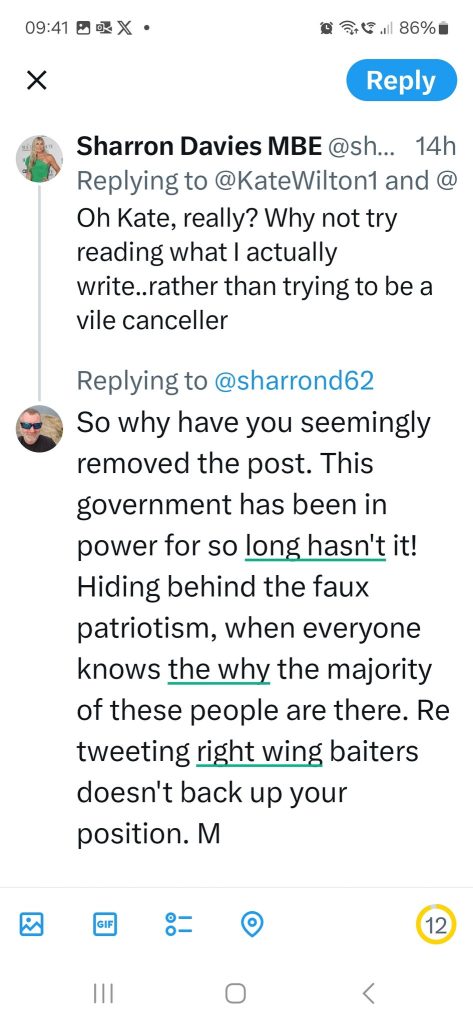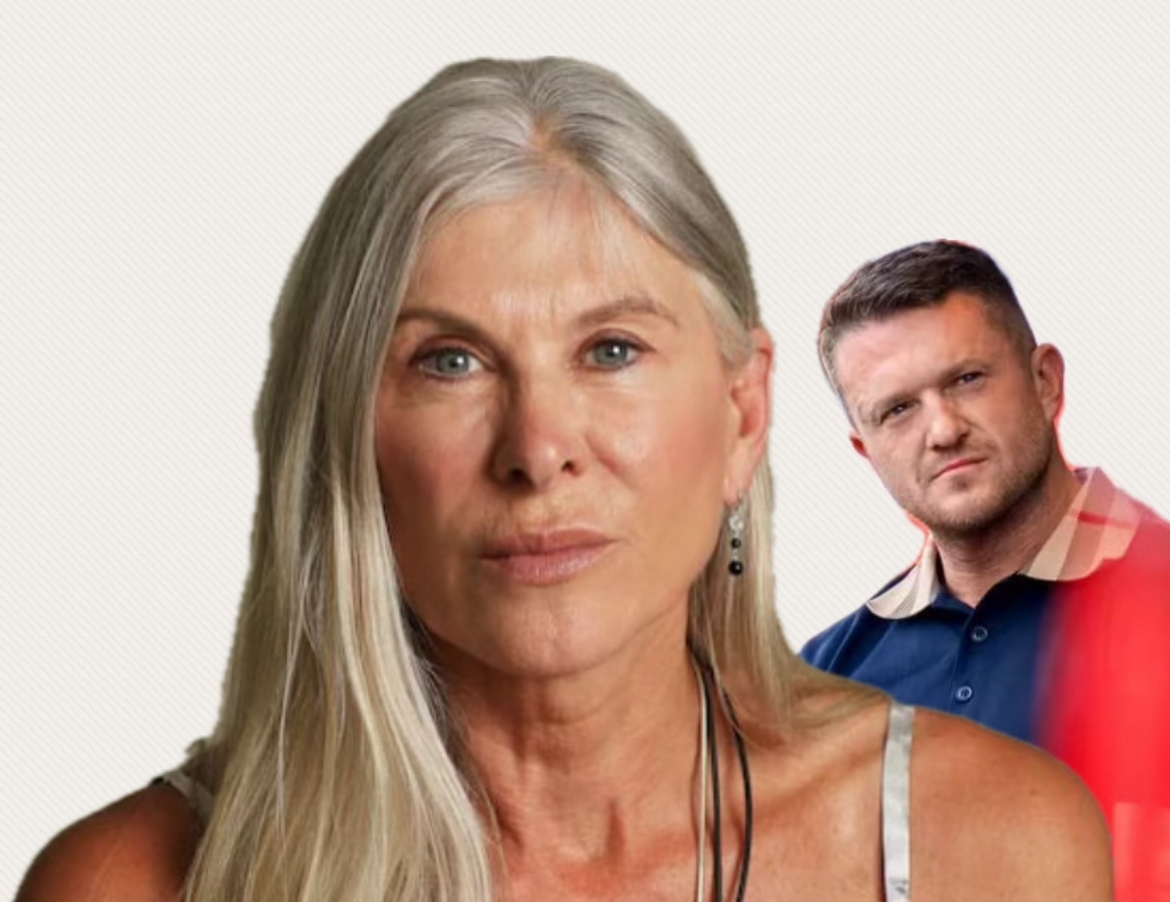Sharron Davies, the former British Olympic swimmer, has become a prominent figure in recent years not only for her sporting legacy but also for her outspoken and often controversial views on social and political issues. Her comments on gender identity, women’s rights, and British culture have stirred debate, particularly as her views on these topics often seem to align with or echo themes commonly associated with far-right ideologies. Through media appearances, opinion pieces, and social media posts, Davies has raised concerns about issues she describes as threats to traditional values and British identity. This stance has led many observers to question whether her perspectives, although framed in terms of fairness and preservation, contribute to an increasingly divisive cultural narrative.
A core issue for Davies has been the inclusion of transgender athletes in women’s sports, a subject on which she has become a vocal critic. She argues that allowing transgender women to compete against cisgender women fundamentally undermines the integrity of female competition. Davies often speaks in terms of “biological reality” and “fairness,” contending that transgender women have inherent physical advantages over cisgender women due to male puberty, even if they undergo hormone therapy. In one interview, she stated, “This isn’t about discrimination; it’s about protecting women’s rights and preserving a level playing field.” Critics, however, argue that her statements oversimplify a complex issue and exclude the experiences and rights of transgender individuals. By focusing on biology as an immutable barrier, Davies taps into a discourse that is often adopted by far-right groups, who argue that gender roles and distinctions are biologically determined and should remain fixed.
The language Davies uses on this subject has also sparked controversy, with many noting that her rhetoric mirrors that of far-right advocacy groups concerned with “protecting women’s spaces.” She has described transgender inclusion as an “existential threat” to women’s sports, asserting that allowing transgender women to participate will lead to “the end of female sports as we know it.” By casting this issue in such stark, absolute terms, Davies contributes to a narrative that positions transgender women as a dangerous “other” to be guarded against, a stance that aligns with far-right nationalist and exclusionary discourses. In framing transgender rights as antithetical to women’s rights, Davies has been accused of using a “protectionist” narrative similar to the way far-right groups frame immigrants or other minority groups as existential threats to national identity or societal cohesion.
Beyond gender identity in sports, Davies has expanded her focus to broader criticisms of what she calls “woke culture” and “political correctness.” She has repeatedly stated that fear of offending progressive sensibilities is stifling free speech and open debate in the UK. She argues that “people are too scared to speak the truth,” describing a cultural climate in which expressing traditional or conservative views on gender, race, and identity results in social censure. This sentiment mirrors far-right complaints about an oppressive “woke” culture that allegedly infringes on freedom of expression. By framing her criticisms in this manner, Davies positions herself as a counter-voice to what she perceives as a dominant progressive ideology, appealing to those who view modern social justice movements as overly censorious. This rhetoric, frequently echoed by far-right figures, portrays progressivism as an authoritarian force and paints the right to express traditional values as under threat.

Davies has also expressed concerns about the erosion of what she sees as traditional British values, particularly in the context of multiculturalism and immigration. In interviews, she has described a sense of “loss” concerning British culture, hinting at her belief that increasing immigration and progressive social movements are diminishing the country’s traditional identity. She once remarked, “It’s heartbreaking to see Britain lose its culture bit by bit,” and she has criticised policies that, in her view, prioritise inclusivity at the expense of British heritage. Such comments align closely with far-right nationalist rhetoric, which often portrays immigration as a threat to national identity and culture. Davies’ references to Britain’s changing cultural landscape resonate with narratives of “cultural preservation” frequently championed by nationalist movements across Europe and North America.
Sharron Davies is not only a relentless transphobe, but also a proud bigot.
— Les Floyd (@Lesism) October 27, 2024
Why is this almost always the case?
The dead and dying veterans of World War II actually fought these kinds of people.
Also, what a gobshite she is. https://t.co/M0bFVH2kxj
Her concerns about British identity and values often extend to education, where she has expressed alarm about what she perceives as ideological indoctrination of young people. Davies has argued that schools are teaching children to question traditional gender roles and, by extension, British cultural norms. She has suggested that discussions of gender identity, sexual orientation, and multiculturalism in education are “damaging” to young minds, warning that children are being “brainwashed” by progressive agendas. This claim echoes far-right propaganda that characterises progressive educational reforms as threats to national stability and traditional family structures. By portraying modern education as a battleground where “traditional” British values are at risk, Davies’ stance closely mirrors far-right arguments that advocate for a return to a more “patriotic” or “traditional” curriculum focused on a singular national identity.
Delusional right wing retired sports star talking bollocks again, what is it about retired sports stars and entertainers that makes them evil and facist,Sharon is the female version of Jim Davidson who hates non conformity in sexual orientation or the poor or paying taxes. https://t.co/9X2oqd0Ygk pic.twitter.com/hXjagqvCkR
— Honest Bob Jenrick , (@CorruptsPower) October 30, 2024
In addition to her concerns about the state of British culture, Davies has frequently voiced a sense of distrust towards large organisations and regulatory bodies, often suggesting that these institutions are compromised by political correctness. Her criticisms have targeted the International Olympic Committee (IOC) and other sporting organisations, which she accuses of bending to progressive agendas rather than upholding fairness in sports. Davies once stated, “These organisations are more concerned with ticking the right boxes than protecting athletes.” This rhetoric aligns with the far-right narrative that global institutions, including organisations like the United Nations and the European Union, are not to be trusted because they are allegedly pushing progressive values onto sovereign nations. By portraying these sporting bodies as entities that undermine fairness to satisfy inclusivity requirements, Davies taps into a narrative of institutional distrust that far-right groups often champion, viewing such organisations as fundamentally compromised by political correctness.
When you start hating on a marginalized group, the trouble is , you then start spiralling towards hating other marginalized people, and before you know it , you're a far right supporter.
— Narinder Kaur (@narindertweets) October 27, 2024
I grew up admiring Sharron Davis..I feel saddened she's become this. https://t.co/6qn7iyc3Cs
Her critiques of institutional power and societal trends frequently extend to a broader discourse about what she perceives as the fragility of British society in the face of “dangerous ideologies.” She has warned that progressive movements are leading to a “divided and unstable society,” a phrase that mirrors far-right alarmism over the decline of “Western civilisation.” Davies has characterised movements for social justice and inclusivity as “extremist” in certain contexts, framing these initiatives as threats to societal harmony rather than as efforts to achieve equality. This portrayal neglects the legitimate grievances of marginalised communities and aligns closely with far-right narratives that view progressive social movements as divisive and detrimental to national unity.
I remember the @BBC suspending Gary Lineker for his left wing views and support for asylum seekers. They’re ok with their presenters, Sharon Davies supporting Tommy Robinson and the far right though? pic.twitter.com/eZIkVFB7Zz
— Kate Wilton (@KateWilton1) October 26, 2024
One of the more controversial aspects of Davies’ statements has been her repeated invocation of the need to “protect women and children,” a sentiment that resonates strongly with far-right rhetoric. This protectionist narrative has been particularly evident in her comments about the potential influence of progressive gender norms on young people. In one tweet, she warned of a “dangerous ideology” that encourages children to “question their own biology.” Such remarks invoke a sense of moral panic similar to the far-right’s alarmist language around issues like gender identity, which they often portray as a threat to traditional family values and the innocence of children. This rhetoric is reminiscent of far-right fearmongering that frames certain social movements as insidious attempts to corrupt or manipulate young people, creating an atmosphere of distrust and suspicion around inclusivity efforts in education and society.
Of all the things to happen in 2024, I never had former Olympian Sharon Davies @sharrond62 proudly come out in support of #Trump, a Rapist and Paedophile, followed by Stephen Yaxley-Lennon, a White Nationalist with a long history of Violence, Fraud and Incitement of Hatred. pic.twitter.com/8zANR9i5lY
— John O'Connell (@jdpoc) October 26, 2024
Additionally, Davies has spoken out against what she describes as the erosion of “traditional family values” in modern British society. She has criticised single-parent families, same-sex parenting, and non-traditional family models, arguing that these forms of family do not provide the “stability” that children need. Her stance reflects a conservative, heteronormative view of family structures, one that far-right groups frequently advocate as part of their ideology. This view positions the traditional family unit as the bedrock of society, threatened by progressive social changes that allegedly undermine its stability. By championing these “traditional values,” Davies supports a narrative that aligns with far-right ideologies on family and society, reinforcing exclusionary views that disregard the diversity of modern family life.
Social media has played a crucial role in Davies’ ability to reach a wide audience with her views, where her posts on Twitter and Instagram frequently garner significant attention. Social media’s algorithms often amplify her polarising opinions, granting her a platform where she can engage directly with supporters and critics alike. This direct engagement allows Davies to build a following that shares her beliefs, creating an echo chamber that can reinforce far-right ideas about national identity, gender roles, and traditional values. Her social media presence thus not only amplifies her own influence but also normalises the language and ideas associated with far-right ideologies among a broader public, contributing to an increasingly polarised social landscape.
So the left were wrong as per usual, and the people on the right were correct . Who says so ,Farage ,Tice ,Wotton, Sharon Davies ,but a few .
— Theoriginaltoryvillageidiot (@eddyhuttory) October 30, 2024
But we didn't smash up and loot business. We didn't set fire to hotel's, we didn't fight with the police.
In general, Sharron Davies’ positions on issues like gender identity, women’s rights, British culture, and family values resonate with narratives that often align with far-right ideologies. Her advocacy for the “protection” of women’s sports from transgender athletes, her critique of “woke culture,” and her concerns about the erosion of British identity are framed in ways that echo far-right discourses on cultural preservation, freedom of speech, and traditionalism. While Davies maintains that her positions are based on fairness and respect for biological reality, her rhetoric often reinforces exclusionary views and contributes to a divisive public discourse. By adopting these narratives, whether consciously or otherwise, Davies adds a high-profile voice to an increasingly prevalent discourse that challenges inclusivity and fuels cultural division. As a former Olympian and public figure, her influence is significant, and her alignment with these themes underscores the complexities and responsibilities of public figures who engage with socio-political debates in a climate of heightened polarisation.







